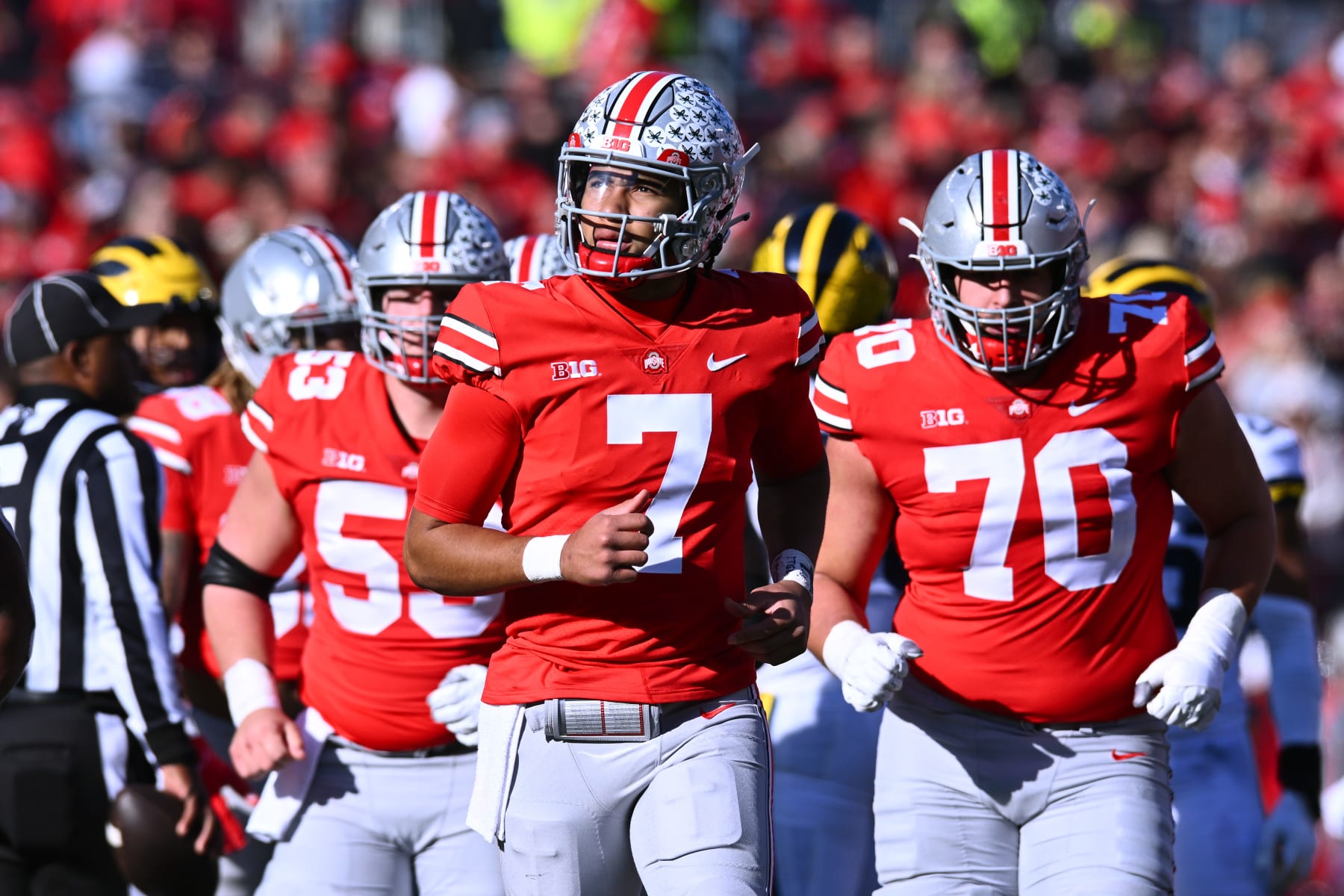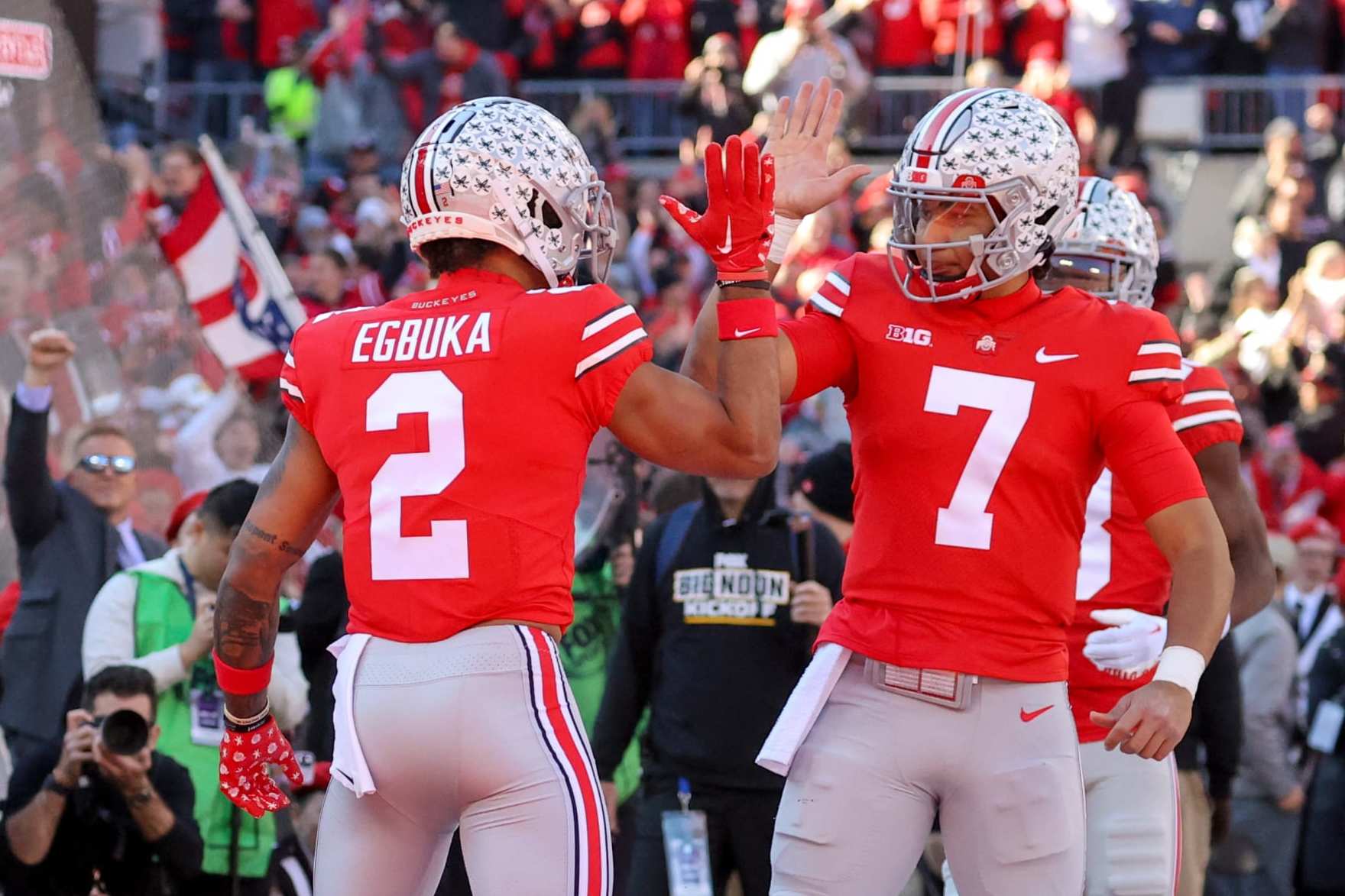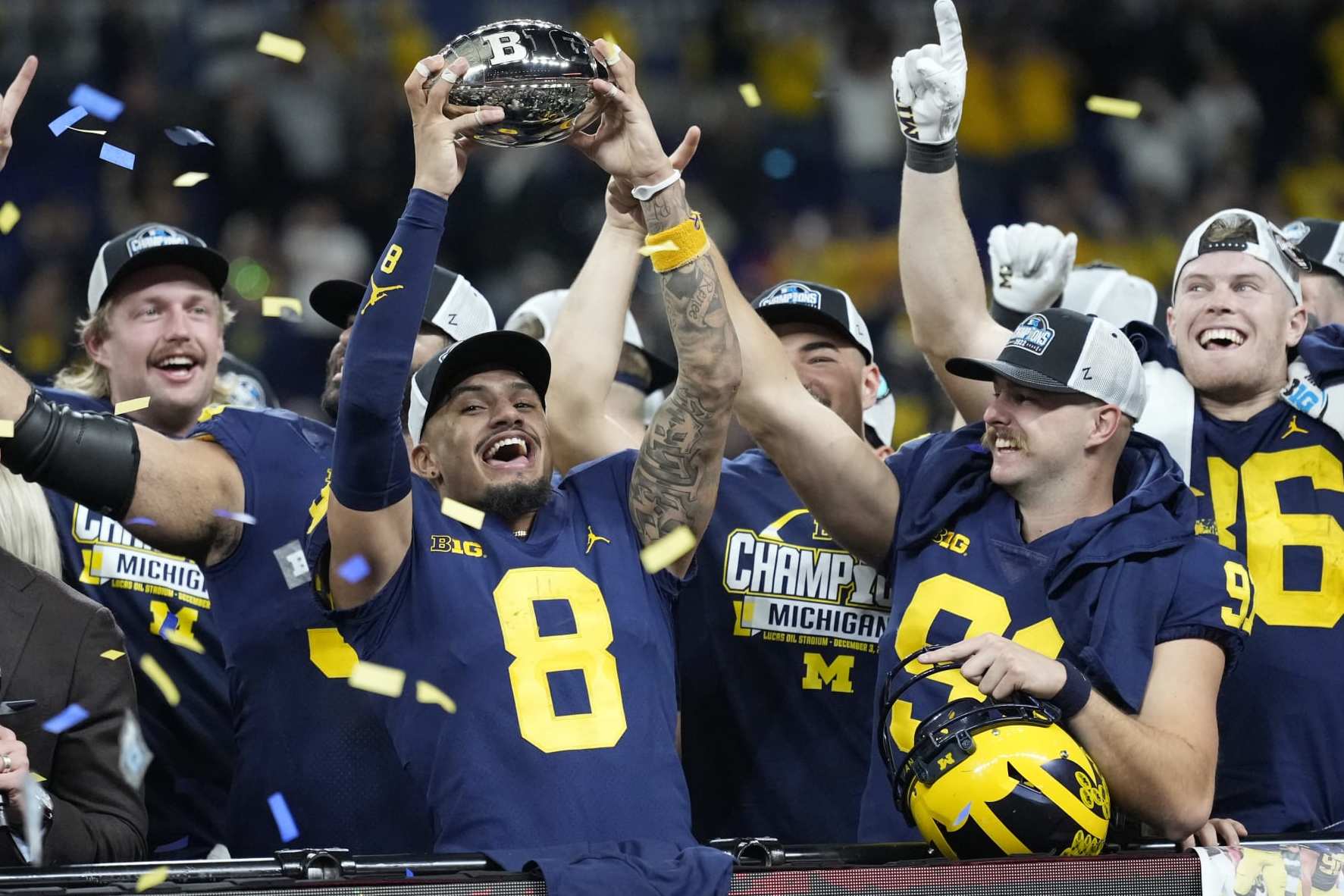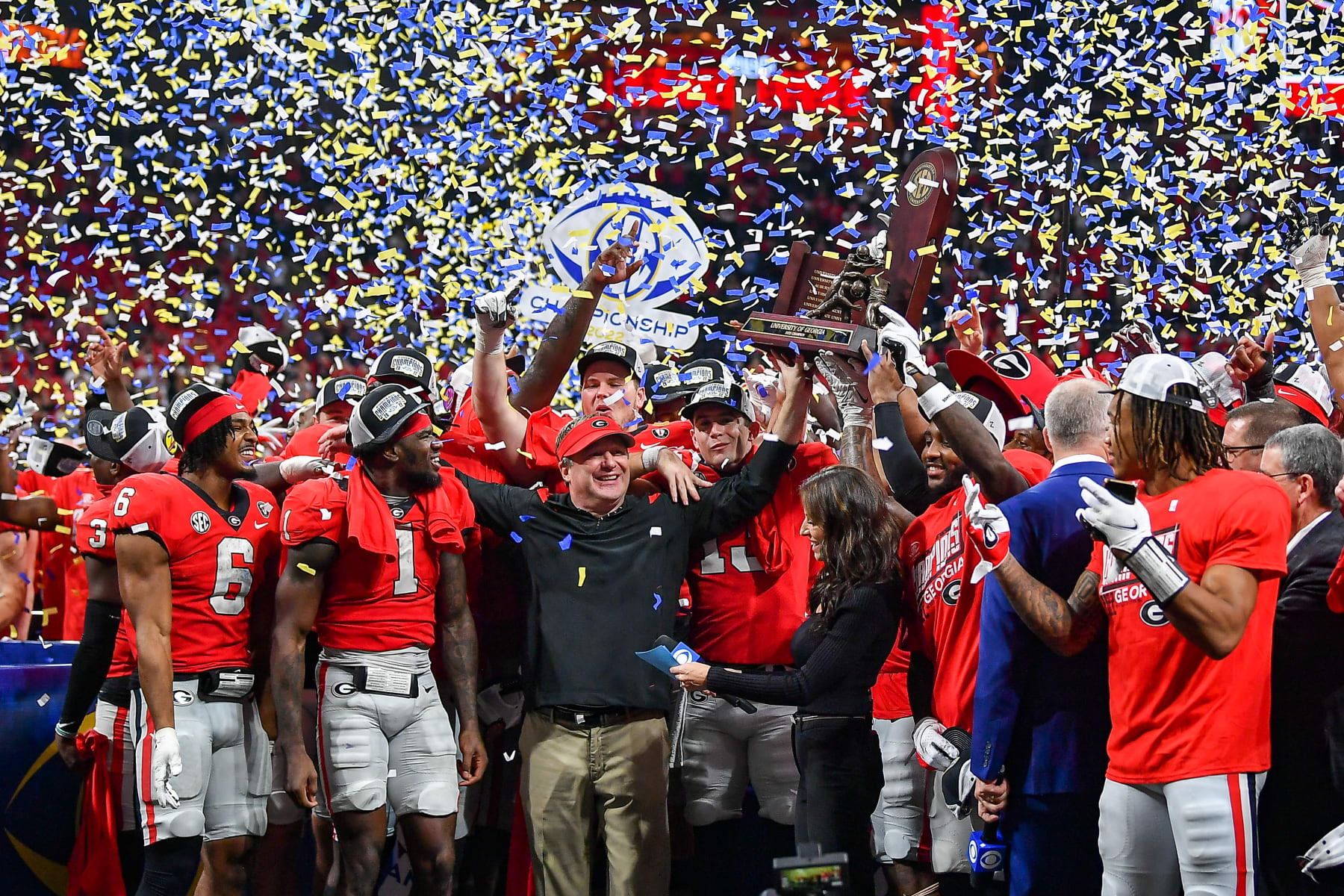Did the 2022 College Football Playoff Selection Committee Get It Right?

The 2022 College Football Playoff is set.
On Sunday afternoon, the playoff selection committee announced that the final four teams were No. 1 Georgia, No. 2 Michigan, No. 3 TCU and No. 4 Ohio State.
The Georgia Bulldogs beat LSU 50-30 in the SEC title game Saturday, and Michigan defeated Purdue 43-22 in the Big Ten championship. TCU lost in overtime 31-28 to No. 10 Kansas State in the Big 12 championship, which was the Horned Frogs' first loss of the season. On Friday evening, USC lost 47-24 to Utah in the Pac-12 title game.
As is the case every year, the lingering question is, did the committee get it right? And as with every season, there are various arguments for both "yes" and "no."
Let's run through some aspects of the criteria that the selection committee uses to determine the final four teams:
- Championships won
- Strength of schedule
- Head-to-head competition (if it occurred)
- Comparative outcomes of common opponents (without incenting margin of victory)
The other unique feature of the CFP relative to the BCS is the human element. The 13-person selection committee offers prospective teams the opportunity to be evaluated via the "eye test."
So what was up for debate as we awaited the final rankings? Heading into championship weekend, the biggest one was what it would do with No. 4 USC.
The playoff picture became much clearer with the Pac-12 Championship Game on Friday night. The 11-1 Trojans, whose only blemish was a one-point loss on the road against these same Utes in October, entered with one task ahead of them: Defeat Utah, and they're in.
However, Utah had other plans. Although this game was 17-all at halftime, the Utes scored 31 points in the second half, with three touchdowns in the fourth. Caleb Williams hurt his hamstring in the first quarter, and with his mobility nonexistent, USC failed to mount a comeback in a 47-24 victory for Utah.

The Trojans' second loss of the year and a lack of a conference championship knocked them out of the playoff hunt.
But perhaps more importantly, it opened the door for 11-1 Ohio State.
Despite sitting at home on Championship Saturday thanks to their loss to Michigan in Week 13, the Buckeyes were the best team remaining to get a bid. They blew out virtually every opponent on their schedule otherwise.
Furthermore, Ohio State's resume was impressive, considering its ranking in ESPN's Football Power Index. The Buckeyes checked in at third in the metric, including a No. 4 Strength of Record Rank, which measures the "chance that an average Top 25 team would have the team's record or better, given its schedule."
OSU also ranked fourth in Game Control Ranks, measuring how an average Top 25 team would control games from start to finish the way the Buckeyes did.
The other big reason that gave Ohio State a bid? The Buckeyes didn't have two losses. USC, Alabama and Tennessee (I'll get to you, Tide and Vols) all had two losses, and there's no justification for putting a two-loss team—even one that made its conference championship game—over a team as good as Ohio State.

Another one-loss team in a much different position is TCU. The committee, unsurprisingly, gave the Horned Frogs a bid, despite their 31-28 loss in overtime to Kansas State in the Big 12 Championship Game that ended their attempt at a perfect season.
Their loss dropped them to fourth in the rankings, but the Horned Frogs were worthy of a spot in the CFP. While they fell short of their first conference title since 2014, they had beaten K-State 38-28 in the regular season.
Let's talk about the other two-loss teams that looked to have a chance to sneak into the playoff. The Tide jumped one spot up to No. 6 behind one-loss Ohio State going into Championship Saturday. Tennessee, meanwhile, moved up three spots to No. 7 following its 56-0 win over Vanderbilt.
Alabama was 10-2 on the season with road losses to Tennessee and LSU. Neither of the losses was bad; they both came down to the wire, and both teams are still ranked.

But two losses are just that: a no-go for the committee. A two-loss team has never made it into the playoff, including those that have won a conference championship.
Bama also didn't have a standout win. You could argue that winning 30-24 on the road against Ole Miss on Nov. 12 could count, but the Rebels dropped out of the playoff rankings in Week 14.
A similar argument can be made when looking at Tennessee. But unlike Alabama, the Vols did have a signature win with their 52-49 victory over the Tide. Tennessee's first loss of the season to Georgia wouldn't have been enough to knock the Vols out of the playoff. What crushed Tennessee's playoff hopes was its shocking 63-38 loss to unranked South Carolina on Nov. 19.
It's the same thing for Alabama: If you lose twice, you likely won't get a playoff bid, especially when four teams either finished undefeated or with one loss.
The only scenario that could have opened the door for a team like Tennessee or Alabama to get a bid is if we had two or three conference champions finish with multiple losses. Instead, Michigan and Georgia both won their conference title games. TCU lost in overtime—not enough to knock the Horned Frogs out. USC's defeat to Utah to finish with two losses opened the door for a one-loss Ohio State.

Then there were the no-brainer bids the committee gave out. Georgia went undefeated through the regular season for the first time since 1982 after demolishing LSU in the SEC Championship Game.
There was no hope for LSU, which entered the matchup with three losses. But even if Georgia lost to the Tigers, the Bulldogs would likely get a bid. Nonetheless, a No. 1 overall seed wasn't surprising for the defending national champions.
Michigan's bid was just as simple. The Wolverines finished a perfect 13-0, knocking off then-No. 2 Ohio State 45-23 on the road to make it into the Big Ten title game. Although the Purdue Boilermakers played well against Michigan, the Wolverines won with ease to defend their conference title.
There wasn't much reason for the Wolverines to jump No. 1 Georgia, but the No. 2 spot is just as worthy.
So did the committee get it right? Its job at the end of the season is clear—pick the four best teams with the strongest resumes and put them in the playoff. If you are a team with two losses, you probably won't make it in since a two-loss team has never made it into the four-team playoff. That eliminated the likes of USC, Alabama and Tennessee. Michigan and Georgia finished the year undefeated after winning their conference title games, so there's no argument for them to not receive a bid.

TCU lost for the first time all season in overtime to a Top 10 team in its conference championship game. The Horned Frogs were definitely worthy of a bid, even with the loss.
Ohio State was the only team remaining with one loss. Aside from losing to Michigan—a playoff team—the Buckeyes beat everyone else on their schedule handily.
After USC lost Friday night, the committee's task of picking the final four teams became a whole lot simpler.
For fans who think the committee didn't get it right, or that teams like Tennessee or Alabama should have gotten in, the good news is we only have two more years of the four-team playoff system. On Thursday, the CFP announced that an expanded 12-team playoff would begin in 2024.
For this year, though, the committee did its job in picking the top four teams at the end of the season.







